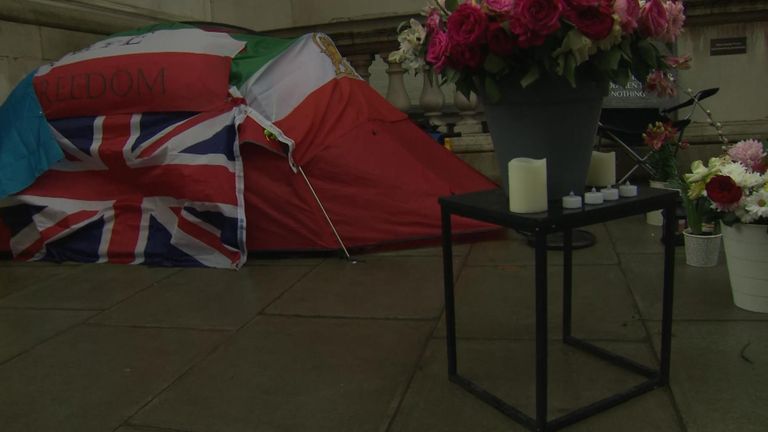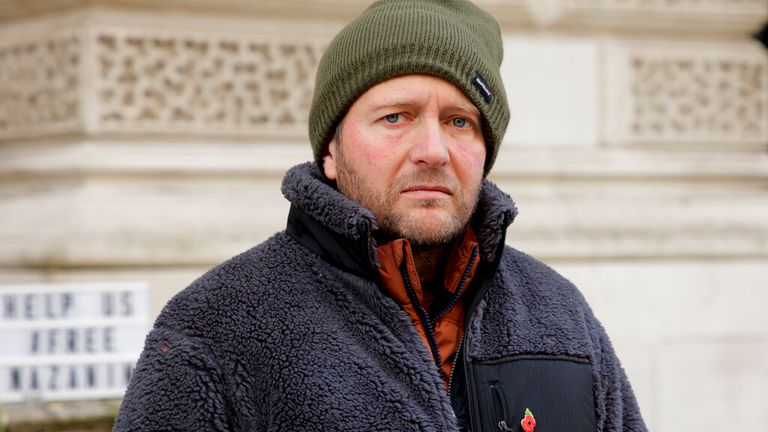
Vahid Beheshti finds it difficult to stand.
The 46-year-old also finds it difficult to sit.
He now spends most of his time lying on a mattress inside a flimsy tent and he told me that he tends to flip in and out of consciousness.
This British-Iranian is on the 30th day of a hunger strike which he is staging in front of the Foreign, Commonwealth and Development office in London.
He wants the UK government to designate Iran’s notorious Islamic Revolutionary Guard Corps (or IRGC) as a terrorist organisation, thereby placing them in the same category as groups like Islamic State, al Qaeda and Hezbollah.
“I am getting weaker physically but internally I am getting stronger and I am determined to achieve this great goal,” he told Sky News as the rain drenched his ad-hoc campsite.
The “Revolutionary Guards” are a state-backed military operation, designed and deployed to protect Iran’s clerical regime. They run extensive operations at home – their volunteer “Basij” militia have been using brutal methods in an attempt to crush a popular revolt in Iran.
Overseas, their agents intimidate and threaten those who criticise the regime.
In London, they were accused of targeting journalists at the television station “Iran International”, based in the district of Chiswick in London. After an escalation of those threats, the station moved its headquarters to Washington DC in February.
“We see the hands of IRGC operating in London when the Met Police asked (television station) Iran International to relocate from London to (Washington) DC because of these threats. That means all of us are not safe because of the IRGC.”
Mr Beheshti says his campaign is supported by the majority of MPs, including Tom Tugendhat, the UK’s security minister.
Mr Tugendhat suggested that it would be justifiable to designate the IRGC as a terrorist organisation after Iran executed a British-Iranian national Alireza Akbari in January.
However, the UK government has not followed through.
Talks on Iran’s nuclear programme have been on hold for months with UN weapons inspectors denied access to the country’s key sites. The Foreign Office may be reluctant to close the door on future negotiations.
Richard Ratcliffe knows exactly what Mr Beheshti is going through.
His wife Nazanin Zaghari-Ratcliffe was arrested by the IRGC on a trip to Tehran in 2016. She was convicted of plotting to overthrow the regime and spent years in the country’s infamous Evin prison.
Mr Ratcliffe mounted a high-profile campaign, which included a hunger strike in 2021, to get his partner released.
“I’ve been on this very spot in a tent like that, for 21 days and that was incredibly hard. I didn’t do it lightly, it felt like a long battle. I feel a lot of what he is going through.”
Read more:
Iran’s alleged ammunition for Russia’s war in Ukraine
Iran issues pardons for 22,000 people arrested in demonstrations
There are moments, says Mr Ratcliffe, when extreme acts of protest are necessary.
“It’s a visceral form of protest, he’s trying to make a clear statement, for the Foreign Office to explain why it is not (proscribing the IRGC).”
He backs the message and the method deployed by Mr Beheshti.
The government is “soft-pedalling” on the “Revolutionary Guards” for reasons which are “very opaque”, he says.
“I think (the UK government) is treating it like a domestic human rights issue for Iran, not a security issue, but (Mr Beheshti) is right. When you have a situation where British journalists are being threatened on the streets of London, the government has to look seriously at what it can do.”













